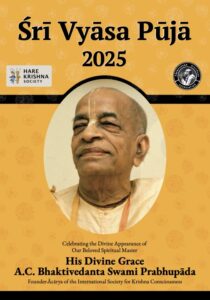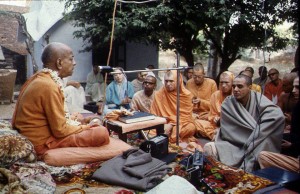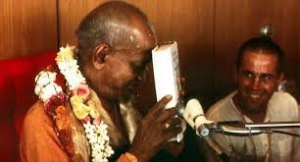July 6 1976 Wash DC
Guest (1): No, sir, we didn’t say Kṛṣṇa of Mahābhārata; we said that when you read the Vedic literatures, there comes some nirguṇa-brahman and saguṇa-brahman. Now my question…
Prabhupāda: But Kṛṣṇa is paraṁ brahman.Guest (1): Yes, but my plain feeling came, sir…Prabhupāda: No, no. First of all, the Brahman, there are… We are all Brahman, living entities. We are simply thinking “I am this body.” So when we are… That I was speaking, liberation. When we come to the conclusion that “I am not this body,” ahaṁ brahmāsmi… So you are already Brahman, but you are, forgetfully, you are thinking that you are Indian. That is māyā. We are all Brahman, but due to our ignorance, lack of knowledge, we are thinking “I am Indian,” “I am American,” “I am Hindu,” “I am Muslim,” “I am Christian,” “I am this,” “I am that.” That is māyā. So when you actually understand that “I am not this body; I am spirit soul,” that is the fact. Then that condition is called brahma-bhūtaḥ. Now we are jīva-bhūtaḥ. We are thinking “I am individual person of this country, of this religion.” That is jīva-bhūtaḥ. But when we understand that we are not jīva-bhūtaḥ, we are brahma-bhūtaḥ, that is our liberated position. Brahma-bhūtaḥ prasannātmā [Bg. 18.54]. When one becomes actually in understanding that “I am not this body, I am spirit soul,” then my all responsibility of this bodily condition immediately ceases. I am not this body. And why I am working for this body? Why I am in ignorance? That is called brahma-bhūtaḥ. Brahma-bhūtaḥ prasannātmā na śocati na kāṅkṣati [Bg. 18.54]. That is liberated stage. So we are already Brahman, there is no question of becoming Brahman. We are mistaking something else, that “I am not Brahman.” So when we come to the actual understanding, ahaṁ brahmāsmi, that is called brahma-bhūtaḥ stage. Brahmā-bhūtaḥ prasannātmā na śocati na kāṅkṣati samaḥ sarveṣu… [Bg. 18.54]. Then he see everyone on equal level, that every soul is Brahman.vidyā-vinaya sampanne brāhmaṇe gavi hastini śuni caiva śva-pāke ca paṇḍitāḥ sama-darśinaḥ [Bg. 5.18]That is sama-darśinaḥ. He sees the same soul within a learned brāhmaṇa and within a dog. Samaḥ sarveṣu bhūteṣu. That is the stage of bhakti.brahma-bhūtaḥ prasannātmā na śocati na kāṅkṣati samaḥ sarveṣu bhūteṣu mad-bhaktiṁ labhate param [Bg. 18.54]So when you come to the standard of bhakti, then you can understand Kṛṣṇa. Bhaktyā mām abhijānāti [Bg. 18.55]. Unless you come to that stage, you cannot understand Kṛṣṇa, you will mistake. Manuṣyāṇāṁ sahasreṣu kaścid yatati siddhaye [Bg. 7.3]. This siddhi means to become liberated from the bodily concept of life. So out of many millions of people, one gets the opportunity of becoming siddha, brahma-bhūtaḥ, and yatatām api siddhānāṁ kaścin māṁ vetti tattvataḥ [Bg. 7.3]. And those who are siddhas, liberated, out of many of them, kaścin māṁ vetti tattvataḥ.
So how this Mr. Bannerji will understand Kṛṣṇa? He is not a bhakta, he cannot understand. He can talk of the honey within the bottle. He cannot taste it. If he wants to taste, somebody must be able to open the bottle and give him little. Then he’ll get. Otherwise, let him lick up the bottle. (laughter) That’s all. So those who are licking the bottle, they cannot say what is the taste of the honey. One must actually taste. That is possible, bhaktyā mām abhijānāti [Bg. 18.55], that taste is available by the bhaktas, not by the so-called scholars. That is not possible. Nāyam ātmā pravacanena labhyaḥ. That is Vedic injunction. Na medhayā, na bahunā śrutena. You cannot realize self by your intelligence or by your learning or by your brain. Nāyam ātmā pravacanena labhyaḥ na bahunā śrutena.
Jan 2 1967 NY
There is another Bengali verse, very nicely: adya ‘pi akāri līlā gaura-rāya kona kona bhagavane dekhibāre pāya…Lord Caitanya’s pastimes going on, still going on, but some of the fortunate devotees, they can see. Anything, God’s pastimes, that is perceivable through devotional service. Bhaktyā mām abhijānāti [Bg. 18.55]. Only way. This is the process. No other process. No amount of speculation, no amount of academic education, no amount of philosophical discussion can…, one can… It is confirmed in the Vedic literature: nāyam ātmā pravacanena labhya, na bahunā śrutena. Na ayam ātmā… This self-realization is not possible. Nāyam ātmā pravacanena labhya, simply by discussion, nobody can arrive. Nobody can understand what is self-realization, what is Supreme Soul, the Absolute Truth. Nāyam ātmā pravacanena, na medhayā. Medhayā means one who is, who has got very good brain substance, he also cannot. Simply by agitating the brain, brain substance, one cannot understand. Nāyam ātmā pravacanena labhya, na bahunā śrutena, na medhayā. Śrutena, one who is highly educated, very good scholar, he also cannot understand. Then, what is the pro…? Janena saba puruṣe tena labhya: a person to whom God reveals Himself, he can understand. So we have to wait for that and for God’s mercy. We have to be engaged in loving, transcendental service, Kṛṣṇa consciousness. Then He’ll reveal.
BG 18.55-One can understand the Supreme Personality as He is only by devotional service. And when one is in full consciousness of the Supreme Lord by such devotion, he can enter into the kingdom of God.
SB 7.9.42 purport... Śrīla Bhaktivinoda Ṭhākura also sings, tumi ta’ ṭhākura, tomāra kukura, baliyā jānaha more: “O my Lord, O Vaiṣṇava, please consider me your dog.” One must become the dog of a Vaiṣṇava, a pure devotee, for a pure devotee can deliver Kṛṣṇa without difficulty. Kṛṣṇa se tomāra, kṛṣṇa dite pāra. Kṛṣṇa is the property of His pure devotee, and if we take shelter of a pure devotee, he can deliver Kṛṣṇa very easily. Prahlāda wants to engage in the service of a devotee, and therefore he prays to Kṛṣṇa, “My dear Lord, kindly give me the shelter of Your very dear devotee so that I may engage in his service and You may then be pleased.” Mad-bhakta-pūjābhyadhikā (Bhāg. 11.19.21). The Lord says, “Engaging in the service of My devotee is better than trying to engage in My devotional service.”




